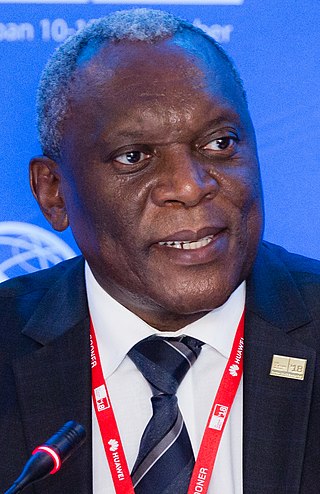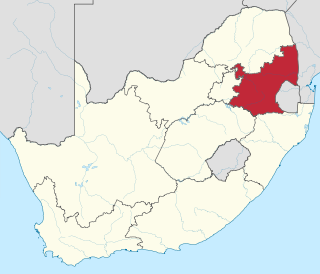The Republic of South Africa is a unitary parliamentary democratic republic. The President of South Africa serves both as head of state and as head of government. The President is elected by the National Assembly and must retain the confidence of the Assembly in order to remain in office. South Africans also elect provincial legislatures which govern each of the country's nine provinces.

The Parliament of the Republic of South Africa is South Africa's legislature; under the present Constitution of South Africa, the bicameral Parliament comprises a National Assembly and a National Council of Provinces. The current twenty-eighth Parliament was first convened on 14 June 2024.

The United Democratic Movement (UDM) is a centre-left, social-democratic, South African political party, formed by a prominent former National Party leader, Roelf Meyer, a former African National Congress and Transkei homeland leader, General Bantu Holomisa, and a former ANC Executive Committee member, John Taylor. It has an anti-separatist, pro-diversity platform; and supports an individualist South Africa with a strong moral sense, in both social and economic senses.

General elections were held in South Africa on Wednesday, 14 April 2004. The African National Congress (ANC) of President Thabo Mbeki, which came to power after the end of the apartheid system in 1994, was re-elected with an increased majority.

The National Assembly is the directly elected house of the Parliament of South Africa, located in Cape Town, Western Cape. It consists of four hundred members who are elected every five years using a party-list proportional representation system where half of the members are elected proportionally from nine provincial lists and the remaining half from national lists so as to restore proportionality.

General elections were held in South Africa on 22 April 2009 to elect members of the National Assembly and provincial legislatures. These were the fourth general elections held since the end of the apartheid era.

The African Independent Congress (AIC) is a minor political party in South Africa.

The 26th South African Parliament was the fifth Parliament of South Africa to convene since the introduction of non-racial government in South Africa in 1994. It was elected in the general election of 7 May 2014 and consists of the National Assembly and the National Council of Provinces. The National Assembly contains 400 members, while the National Council of Provinces contains 90 members. Members of Parliament were sworn in on 21 May 2014. The 26th parliament first convened on 21 May 2014 to elect Jacob Zuma as the fifth democratically elected President of South Africa. It was formally opened by president Zuma's State of the Nation Address in a joint sitting on 17 June 2014.

Siyabonga Cyprian Cwele is a South African politician who served in the cabinet of South Africa from September 2008 to May 2019, most recently as the Minister of Home Affairs between 2018 and 2019. He was appointed as the South African Ambassador to China in December 2020. He is a member of the African National Congress (ANC) and represented the party in Parliament from 1994 to 2019.

Luwellyn Tyrone Landers was a South African politician who was the Deputy Minister of International Relations and Cooperation between May 2014 and May 2019. He represented the African National Congress (ANC) in the National Assembly of South Africa from May 1994 to May 2019.

The 27th South African Parliament was the sixth Parliament of South Africa to convene since the introduction of non-racial government in South Africa in 1994. It was elected in the general election of 8 May 2019 and consists of the National Assembly and the National Council of Provinces. The National Assembly contains 400 members, while the National Council of Provinces contains 90 members. It was formally opened by President Ramaphosa's State of the Nation Address in a joint sitting on 20 June 2019.

KwaZulu-Natal is one of the nine multi-member constituencies of the National Assembly of South Africa, the lower house of the Parliament of South Africa, the national legislature of South Africa. The constituency was established in 1994 when the National Assembly was established by the Interim Constitution following the end of Apartheid. It is conterminous with the province of KwaZulu-Natal. The constituency currently elects 41 of the 400 members of the National Assembly using the closed party-list proportional representation electoral system. At the 2019 general election it had 5,524,666 registered electors.

Mpumalanga is one of the nine multi-member constituencies of the National Assembly of South Africa, the lower house of the Parliament of South Africa, the national legislature of South Africa. The constituency was established as Eastern Transvaal in 1994 when the National Assembly was established by the Interim Constitution following the end of Apartheid. It was renamed Mpumalanga in 1999. It is conterminous with the province of Mpumalanga. The constituency currently elects 15 of the 400 members of the National Assembly using the closed party-list proportional representation electoral system. At the 2019 general election it had 1,951,776 registered electors.

North West is one of the nine multi-member constituencies of the National Assembly of South Africa, the lower house of the Parliament of South Africa, the national legislature of South Africa. The constituency was established in 1994 when the National Assembly was established by the Interim Constitution following the end of Apartheid. It is conterminous with the province of North West. The constituency currently elects 13 of the 400 members of the National Assembly using the closed party-list proportional representation electoral system. At the 2019 general election it had 1,702,728 registered electors.
Bekizwe Simon "Bheki" Nkosi is a South African politician who current represents the African National Congress (ANC) as a Member of the National Assembly since 2019. An attorney by training, he was formerly a Member of the Gauteng Provincial Legislature from 1997 to 2012 and he served on the Gauteng Executive Council from 2009 to 2012. He was the deputy president of the ANC Youth League from 1994 to 1996.
Masefako Clarah Dikgale is a South African politician who was a Member of the National Assembly of South Africa from 2019 to 2023. Prior to serving in the National Assembly, she served as a permanent delegate to the National Council of Provinces from Limpopo from 2009 to 2019. Dikgale is a member of the African National Congress.
Zola Mlenzana is a South African politician. A former member of the Congress of the People, he was elected as a Permanent Delegate to the National Council of Provinces from the Eastern Cape in 2009. In 2014 he resigned from COPE and rejoined the African National Congress. Mlenzana was elected to the National Assembly in 2019.
Beauty Nomvuzo Dlulane is a South African politician who is currently serving as the chairperson of the Portfolio Committee on Sports, Arts and Culture in the National Assembly of South Africa. She has represented the African National Congress (ANC) in Parliament since 1997. Between 2012 and 2022, she was also a member of the National Executive Committee of the ANC.
Mlindi Advent Nhanha is a South African politician and businessman from the Eastern Cape who has served as a permanent delegate to the National Council of Provinces since 2019. Nhanha is a member of the Democratic Alliance.
Archibold Jomo Nyambi is a South African politician from Mpumalanga. He has been House Chairperson of Committees in the National Council of Provinces (NCOP) since 2014. Before joining the NCOP in 2009, he served in the National Assembly from 2006 to 2009.














